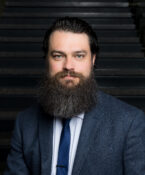Can nicotine actually heal the brain?
Nicotine typically conjures up images of cigarettes and smoking, addiction, cancer and lung disease. But not so for Victor Uteshev, PhD, Associate Professor of Pharmacology and Neuroscience, who sees nicotine as an opportunity for good.
Uteshev’s research concentrates on the positive effects chemicals such as nicotine may have on the brain – as in enhancing cognitive performance and resistance to brain injury, particularly in aging patients and people who have high risk for stroke and traumatic brain injury.
"When people smoke or use a nicotine patch or even chew nicotine gum, nicotine gets in the bloodstream and in the brain, and binds to certain receptors – which ultimately create an electric current in neurons," said Uteshev. "It changes the electrochemical status of the neuron. The neuron becomes slightly different – more excited and more resilient – and releases other chemicals which trigger a system of events which change the entire chemical environment in the brain."
This environmental change can be either positive or negative, Uteshev said. "In the case of smoking, the change can result in negative health effects such as deficits in cardiovascular function and cancer."
This change in brain chemicals also has proven to be beneficial, in optimal doses. "Some smokers can think more clearly for a few minutes or so after a cigarette," he said.
"We are focusing on compounds that are similar to nicotine but can bring mostly positive effects. In many diseases and pathological conditions, the brain doesn’t create enough of these nicotine receptors and natural compounds that activate these receptors. In diseases and conditions such as schizophrenia, Alzheimer’s and traumatic brain injury, the level of activation of nicotine receptors is deficient and cannot support normal brain function. Our goal is to develop clinically tested drug therapies that can compensate for these deficits and improve or restore cognitive and autonomic functions in patients with age, disease and trauma-related impairments."
.





Social media